- Home
- Patricia Briggs
Masques s-1 Page 11
Masques s-1 Read online
Page 11
Wolf made a sound that could have been a laugh. “Yes, something happened. Either the method that he was trying to use wasn’t successful, or he wasn’t ready for the amount of power I drew; but before he could do anything, I destroyed most of the tower we were in. The stones were melted. I don’t know how he managed to keep us alive, but he did. It was three months before I could bring myself to collect enough magic to light a candle.” He paused for a minute, collecting his thoughts or dealing with the memory.
Aralorn waited patiently for him to continue or not, as it suited him. He had told her more about himself in the last five minutes than he’d told her in the four years she’d known him. If he chose to stop, she wasn’t going to push him.
In time, he began again. “That was when he turned to the older texts. He began to experiment with drawing power from others. Not with me, because that first experiment had proved such a disaster. It was during these experiments that he found that with the aid of certain rituals—rituals forbidden even before the Wizard Wars, if you can imagine anything those wizards would have forbidden—he could use the power of untrained magic-users, especially children. They don’t have the defenses that others do.” He stopped again, his golden eyes bleak.
* * *
I should stop here, he thought. She knew what he did now about the ae’Magi. If something happened to him, she might be about to find another mage—surely some of the more powerful mages could work themselves free, if the half-trained wreck that he’d been had managed it. But he was consumed by the desire, the need to let her glimpse the monster that he was, to destroy her belief that Wolf, her wolf, was some kind of paladin for right and justice.
“For a long time, I helped him,” he continued. To his surprise his voice was still its sepulchral self, cool tones that gave no hint of the volcano of emotion that seethed within him. It sounded as though he were telling the story about someone else. “You need to know that.” I need you to know that. “Even though I knew what he was. I used dark magic, knowing it was evil. I worked his will and gloried in the power and the madness of it. Knowing what he was, I tried to please him.”
His hands gripped the table until they were white-knuckled, he noticed, but he couldn’t force them loose. Maybe she wouldn’t see them. Maybe he didn’t care if she did.
“What happened?” she asked. As if she were pulling information for an assignment, something that had nothing to do with her.
When he didn’t speak, she did. “What happened? What changed?”
Didn’t she understand what he’d told her? Where was her fear? Her disgust? Then he remembered—she was a green mage, not a real one. She wouldn’t know exactly how bad it was, how evil the things he’d done. The screams of the innocent and the not-so-innocent—he could still hear them sometimes when he permitted himself to.
He released his grip on the table abruptly. He didn’t want to hurt her, he reminded himself, and if he let himself get . . . She wanted a story, something pleasing, something hopeful. Something he could talk about without touching on things best left alone.
He started almost at random. “When I was young, the passages of the ae’Magi’s castle fascinated me.” That was good, he could feel something settle down. “I wandered through them for hours, sometimes days.” When he could. While the ae’Magi traveled, or had to attend to others who couldn’t know what he did. “There are places in the passages that haven’t seen human hands for generations.” The discovery of those safe, dark ways had saved him, he thought. “About a year before I left the castle, I found an abandoned library. A whole library that no one but me had been in for a very long time.” A private library, he thought later. Some ae’Magi had picked out favorite books and tucked them away where he could keep them to himself.
“It fascinated me. Almost everything that I had read before I found the library was grimoires and the like. Books I had been told to study.” Endless lists, useless, weak, or broken spells, he figured out later. Things to keep him busy without really educating him. “There were books in the little room of another ilk entirely. Someone had collected books about people—histories, biographies, myths, and legends. I learned from what I read.” He hesitated, understanding for the first time that he’d actually been answering her question—what had happened to change his path. He looked at her, but her face was still, intent on picking through every word he gave her. Impossible to tell what she was thinking, when she was just listening.
“What I learned made my current occupation . . . more distasteful. So I left.” Those were Aralorn’s words when she told people why she was no longer filling the role of daughter to one of the best-loved heroes in Reth. He wondered if those words covered up as much for her as they did for him.
She smiled at him and touched her finger to her temple in salute. She’d heard the echo.
The smile let him end his story as lightly as he’d tried to begin it. “Departing the castle was easy enough; but changing what I am has proven to be more challenging.”
“If you change into one of those zealots who give everything they have to the poor and go around all the time telling everyone else to do the same, I will feed you to the Uriah myself.”
She startled a laugh out of him, and he shook his head in mock reproof. “You ought to watch what you say around me. I might forget that I have repented of my evil ways and turn you into something really nasty.”
FIVE
Myr, Aralorn decided approvingly, had the soul of a sergeant where a king’s should have been. Sometime during the night, he had apparently decided that the camp needed improvement more than the refugees’ weapons skills did.
After breakfast, anyone who could ply a needle was sent to turn yards of fabric into a tent. The design of the tent was Myr’s own, based loosely on tents used by the northern trappers.
When the project was finished, there would be three large tents that could house the population of the camp through the winter. The tents would be stretched over sturdy frames, designed to withstand the weight of the snow. The exterior of the tent was sewn with a double wall so it could be stuffed with dry grass that would serve as insulation in the winter. A simple, ingenious flap system would make it possible to keep a fire inside the tent.
Those who could not sew, or who were too slow to grab the needles Myr had also procured, were put to work building what Myr termed “the first priority of any good camp”—the lavatories.
The risk of disease was very real in any winter camp, and any military man knew stories of regiments destroyed by plagues because of the lack of adequate waste facilities. Myr’s grandfather had been a fanatic on the subject. Myr, thought Aralorn with private amusement, was more like his grandfather than some people in the camp could appreciate.
Aralorn, needleless and worried that Myr would notice, searched futilely for Wolf and noticed Edom looking frustrated as he was trying to stop the tears of a little girl in a ragged purple dress.
“I want Mummy. She always knows how to fix it so her hat doesn’t come off.” Clutched in the child’s grubby hand was an equally grubby doll.
“Astrid, you know that your mum isn’t here and can’t help you,” said Edom impatiently. This was the child who’d been rescued by a stranger in Wolf’s caves. Aralorn looked at her with interest. How had a girl as young as Astrid made it to the camp safely without kin? Maybe someone had brought her—she’d ask Wolf. In the meantime, she couldn’t leave Edom so obviously over his head.
“Hello, Astrid,” Aralorn said, and got a suspicious look in return.
After a wary second, the girl said, “Hullo.”
“Boys don’t know how to dress dolls,” said Aralorn, squatting down until she was at eye level.
Astrid looked at her distrustfully for a minute before slowly holding out doll and hat.
Years of being the oldest daughter of fourteen gave Aralorn the experience to twist the hat on at just the right angle so that it slipped firmly over the doll’s wooden head and caught on the notch that ha
d been carved to hold it in place. Astrid took the doll in one hand and smeared her tear-wet cheeks with the other.
“Can you see if you can get all of you young ones over here?” asked Aralorn. Astrid nodded and ran off.
Turning to Edom, Aralorn said, “I take it that you are supposed to be keeping an eye on the children?”
Edom rolled his eyes. “Always.”
“I can relieve you for a while if you like.”
He nodded and took off with a grin before she could take it back. She wondered if he’d be as pleased when Myr cornered him for latrine duty.
She had the children sit in a semicircle around her. Some of them did it with a sort of hopelessness that broke her heart. Astrid was the youngest by several years. Most of them were ten or eleven, with a few older and a few more younger. There were more girls than boys. Wary eyes, eager eyes, restless eyes, children were a much more difficult audience than adults because no one had yet had a chance to teach them that it was better to be polite than honest.
Before she began, she looked at their faces to help her select a story. At breakfast, Stanis had told her that most of them hadn’t been there much over a month. None of them had any family at the camp, and judging by Astrid’s tears, they were all feeling lost.
She sat cross-legged and looked at them. “Do you have a favorite story? I won’t claim to know every story anywhere, but I know most of the common ones.”
“ ‘Kern’s Bog’?” suggested one girl. “Kern’s Bog” was a romantic story about a boy and his frog.
“ ‘The Smith,’ ” said Tobin in a rusty little voice. Everyone looked at him, so Aralorn guessed that it wasn’t just in her company that he was mute. “My pa, he told me it. Right before I had to leave.”
It wasn’t a gentle story, or, really, a children’s story. But, she supposed, sometimes a story isn’t about entertaining.
“All right,” she agreed. “But you will have to help me if I get parts wrong or forget things. Can you do that?”
She waited until they agreed.
“Very well,” she said, sitting back and settling into the proper frame of mind. “Once upon a time, when the old gods walked the earth and interested themselves with the affairs of men, there lived a smith in a small village. The smith was skilled, and his name was known far and wide. Although he was a gentle man, he lived in a time of war and so spent most of his day shoeing the great warhorses of the nobility, mending their weapons, and creating and repairing their armor.”
A hand went up.
She stopped and tilted her head, inviting a dirty girl with two mismatched braids to speak.
“He didn’t do it to get rich,” she said. “It was because the war made food expensive. And if he didn’t make swords and stuff, his family would have starved.”
Aralorn nodded. “These things he did so that he would have money to live, for food was scarce and dear. But at night, in the privacy of the forge, he created other things. Sometimes they were practical, like rakes and hoes or buckles. Sometimes, though, he made things whose only purpose was to be beautiful.”
“The war god,” said a boy, one of the younger ones, jumping to his feet. “The war god comed. He comed and tried to take the beautiful thing for himself.”
“Hands, please,” said Aralorn.
The boy’s hand shot up.
“Yes?”
“The war god comed,” he said in a much more polite voice.
“So he did,” she agreed. “Temris, the god of war, broke his favorite sword in battle. He heard of the smith’s skill and came to the village one night and knocked upon the smithy door.
“The smith had been working on a piece of singular beauty—a small intricately wrought tree of beaten iron and silver wire bearing upon each branch a single, golden fruit.” It had always sounded to her like something a gold-smith or silversmith might make, but it was an old story. Maybe back then a smith did all those things: shod horses, made armor and jewelry. “Temris saw it and coveted it and, as was the custom of the gods when they wanted something from a mortal, demanded it.”
“’Cause he was greedy,” someone said.
She looked around, but no hands went up, so she ignored the comment. They were all old enough to know proper protocol for storytelling. “The smith refused. He said, ‘You who are creator of war cannot have something that is rooted in the hope of peace.’ ”
Stanis raised his hand. “How come a tree with fruit is rooted in the hope of peace?”
Tobin said, “My father said it was because during a war there aren’t any fruits on any trees.”
Aralorn looked at the solemn little faces and wished Tobin had chosen a happier story. “The smith cast the statue to the ground, and such was his anger, he shattered it into a thousand thousand pieces. Temris was angered that a lowly smith would deny him anything.” Aralorn dropped her voice as low as she could and spoke slowly, as befitted a god of war. “ ‘I say now, smith, that you will forge only three more pieces, and these will be weapons of destruction such as the world has never before seen. Your name will be forever tied to them, and you will be known forever as the Smith.’
“The smith was horrified, and for many days he sat alone in the forge, not daring to work for fear of Temris’s words. During this time, he prayed to Mehan, the god of love, asking that he not be forced to build the instruments of another man’s destruction. It may be that his prayer was answered, for one day he was seized by a fit of energy that left all the village amazed. For three fortnights he labored, day and night, neither eating nor sleeping until his work was done.”
“My ma said that if you spent six weeks not eating, you’d starve to death,” said one of the older girls.
“Not if the gods don’t want them to,” said Tobin fiercely. “Not if they have things to do that are important.”
“Quiet, please,” Aralorn told them. “Raise your hand if you have something to help me.”
They settled down, so she resumed the story. “The weapons he created could only be used by humans, not gods. He made them to protect the weak from the strong. He built Nekris the Flame, which was a lance made of a strange material: a red metal that shimmered like fire.”
A hand was raised. “It kills sea monsters,” Aralorn’s newest helper informed her.
Aralorn nodded. “It was Nekris that King Taris used to drive the sea monster back into the depths when it would have destroyed his city.
“The second weapon was the mace, Sothris the Black. The weapon that, according to legend, was responsible for one of the nine deaths of Temris himself. It was used during the Wizard Wars to destroy some of the abominations created in the desperate final days.
“The last weapon was the sword, Ambris, called also the Golden Rose. There are no stories about Ambris. Some say that it was lost or that the gods hid it away for fear of its power. But others, and I think they are right, say it was hidden until a time of great need.”
“Donkey warts!” exclaimed Stanis wide-eyed. “Your sword is a rosy color and kind of gold.”
She raised her eyebrows and pulled it out so all the children could see it. “Well, so it is.”
“It’s kinda puny, though,” said one young boy a year or two older than Stanis, after careful inspection.
She nodded seriously. “I think you’re right. Ambris is big enough that only a strong warrior could hold her. This sword was built for a small person—like me or you.”
The boy gave her a little grin of solidarity.
“A big strong warrior like our King Myr?” asked someone else.
She sheathed her sword before someone decided to touch it and got cut. “Exactly like our King Myr.”
Stanis, evidently deciding the topic of Ambris had been covered enough, said, “Do you know any other stories? Other ones about swords an’ gods an’ stuff? I like ’em with blood an’ fight’n, but Tobin says that it might scare the young’uns.”
Aralorn grinned and started to reply, but noticed that Wolf was waiting nea
rby. Beside him was Edom. “It looks like I’ll have to wait and tell you a story another time. Remind me to tell you the one about a boy, his dog, and a monster named Taddy.”
Edom came up to her. “Thank you for the break,” he said with a short bow. “I am most grateful. But Wolf says he needs you more than Myr needs another hand at the trenches.”
“Watching the children is better than digging?” she asked.
He grinned. “Absolutely. Hey, Stanis, how about you help me get a game of Hide the Stone going?”
And a moment later they were all running for the bushes to search for just the right stone.
“So you wield Ambris now?” Wolf commented, walking toward her when Edom and the children were gone.
She hopped to her feet. “Of course. I am Aralorn, Hero of Sianim and Reth, didn’t you know?”
“No.” She heard the smile in his voice. “I hadn’t heard.”
She shook her head and started for the caves. “You need to get out more, have a few drinks in a tavern, and catch up on the news.”
“I think,” he said, “even as isolated as we are here, I should have heard of the woman who wields Ambris.”
Aralorn laughed. “Half the young men in Sianim paint their maces black. And at the Red Lance Inn of the Fortieth’s favor, just a few blocks from the government building, there’s a bronze ceremonial lance on the wall that the innkeeper swears is Nekris. I guess we don’t have to worry about the ae’Magi, you and I. We’ll just take Nekris and Ambris to destroy him.”
After a few silent steps, she said, “I will admit, though, that when I found it in the old weapons hall at Lambshold, when I was a kid not much older than these, I used to pretend I’d found Ambris.”
She drew the sword and held it up for his inspection. It gleamed pinkish gold in the sunlight, but aside from the admittedly unusual color, it was plain and unadorned. “It was probably made for a woman or young boy, see how slender it is?” She turned the blade edgewise. “The color is probably the result of a smith mixing metals to make it strong enough not to break even if it is small enough for a woman. Even the metal hilt isn’t unusual. Before the population of magic-users began to recover from the Wizard Wars, there were many swords made with a metal grip. It has only been in the last two hundred years that metal hilts have become rare.” As if he needed her to tell him that. “Sorry,” she said sheepishly. “That’s what happens when I’ve been storytelling to the children.”

 Wolfsbane
Wolfsbane When Demons Walk
When Demons Walk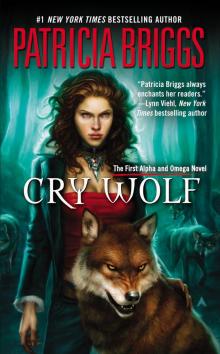 Cry Wolf
Cry Wolf On the Prowl
On the Prowl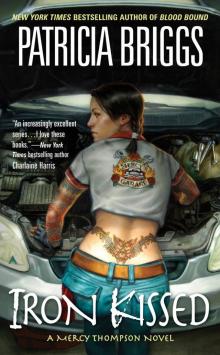 Iron Kissed
Iron Kissed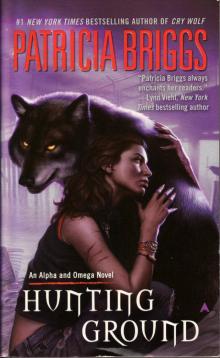 Hunting Ground
Hunting Ground Patricia Briggs Mercy Thompson: Hopcross Jilly
Patricia Briggs Mercy Thompson: Hopcross Jilly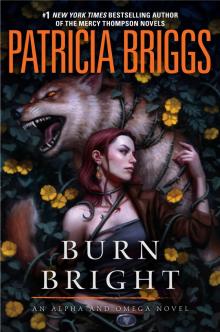 Burn Bright
Burn Bright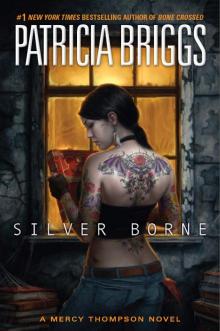 Silver Borne
Silver Borne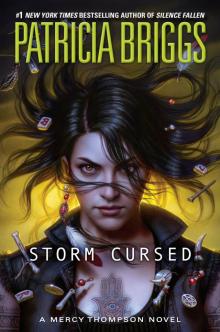 Storm Cursed
Storm Cursed Shifting Shadows
Shifting Shadows Frost Burned
Frost Burned River Marked
River Marked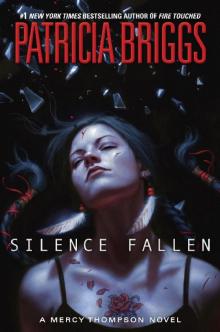 Silence Fallen
Silence Fallen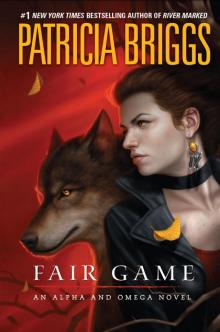 Fair Game
Fair Game Moon Called
Moon Called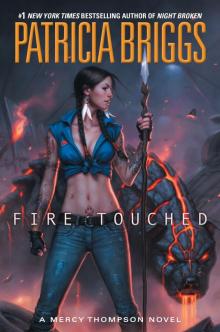 Fire Touched
Fire Touched Dead Heat
Dead Heat Blood Bound
Blood Bound Dragon Bones
Dragon Bones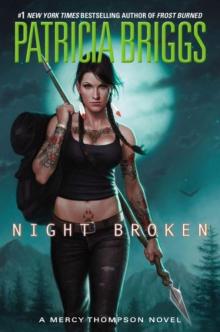 Night Broken
Night Broken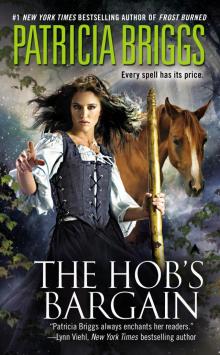 The Hobs Bargain
The Hobs Bargain Ravens Shadow
Ravens Shadow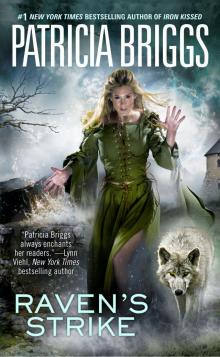 Ravens Strike
Ravens Strike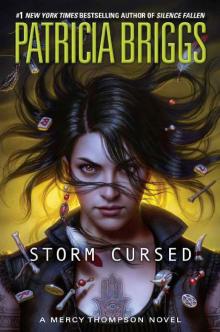 Storm Cursed (A Mercy Thompson Novel)
Storm Cursed (A Mercy Thompson Novel) Bone Crossed
Bone Crossed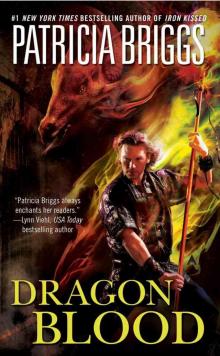 Dragon Blood
Dragon Blood Smoke Bitten: Mercy Thompson: Book 12
Smoke Bitten: Mercy Thompson: Book 12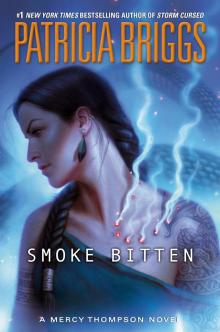 Smoke Bitten
Smoke Bitten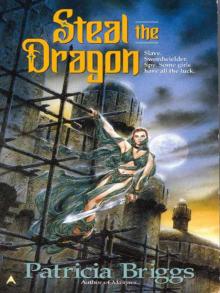 Steal the Dragon
Steal the Dragon 0.5 On The Prowl (alpha and omega)
0.5 On The Prowl (alpha and omega) Alpha and Omega
Alpha and Omega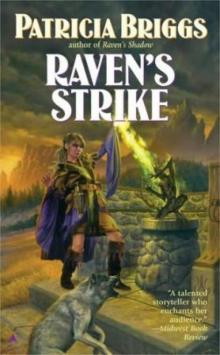 Raven's Strike rd-2
Raven's Strike rd-2![[Mercy 03] - Iron Kissed Read online](http://i1.bookreadfree.com/i/03/24/mercy_03_-_iron_kissed_preview.jpg) [Mercy 03] - Iron Kissed
[Mercy 03] - Iron Kissed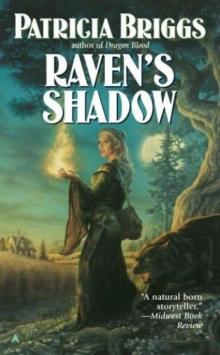 Raven's Shadow rd-1
Raven's Shadow rd-1 Frost Burned mt-7
Frost Burned mt-7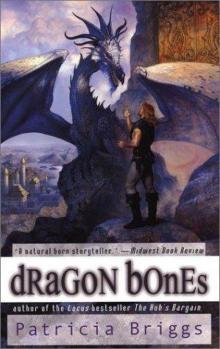 Dragon Bones h-1
Dragon Bones h-1 Shifting Shadows: Stories from the World of Mercy Thompson
Shifting Shadows: Stories from the World of Mercy Thompson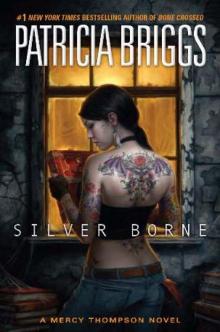 Silver Borne mt-5
Silver Borne mt-5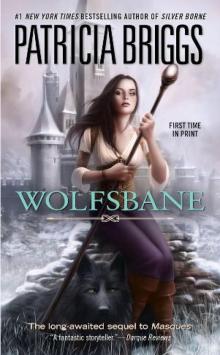 Wolfsbane s-2
Wolfsbane s-2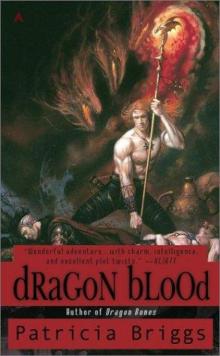 Dragon Blood h-2
Dragon Blood h-2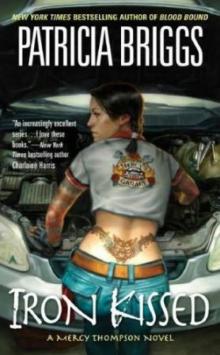 Iron Kissed mt-3
Iron Kissed mt-3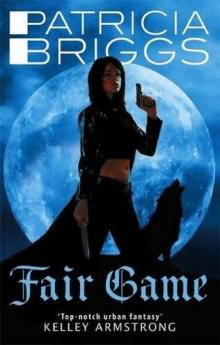 Fair Game aao-3
Fair Game aao-3 Masques s-1
Masques s-1![[Hurog 01] - Dragon Bones Read online](http://i1.bookreadfree.com/i1/04/03/hurog_01_-_dragon_bones_preview.jpg) [Hurog 01] - Dragon Bones
[Hurog 01] - Dragon Bones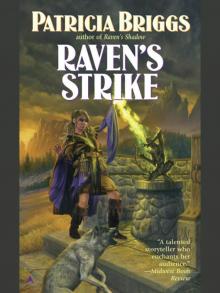 Raven s Strike
Raven s Strike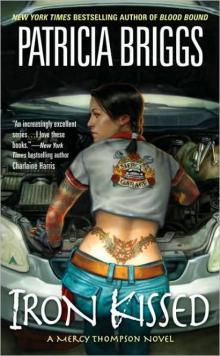 Mercedes Thompson 03: Iron Kissed
Mercedes Thompson 03: Iron Kissed Bone Crossed mt-4
Bone Crossed mt-4 Blood Bound mt-2
Blood Bound mt-2![[Mercy 01] - Moon Called Read online](http://i1.bookreadfree.com/i2/04/09/mercy_01_-_moon_called_preview.jpg) [Mercy 01] - Moon Called
[Mercy 01] - Moon Called River Marked mt-6
River Marked mt-6 The Mercy Thompson Collection
The Mercy Thompson Collection Moon Called mt-1
Moon Called mt-1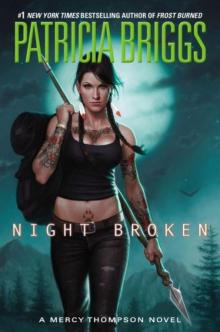 Mercy Thompson 8: Night Broken
Mercy Thompson 8: Night Broken